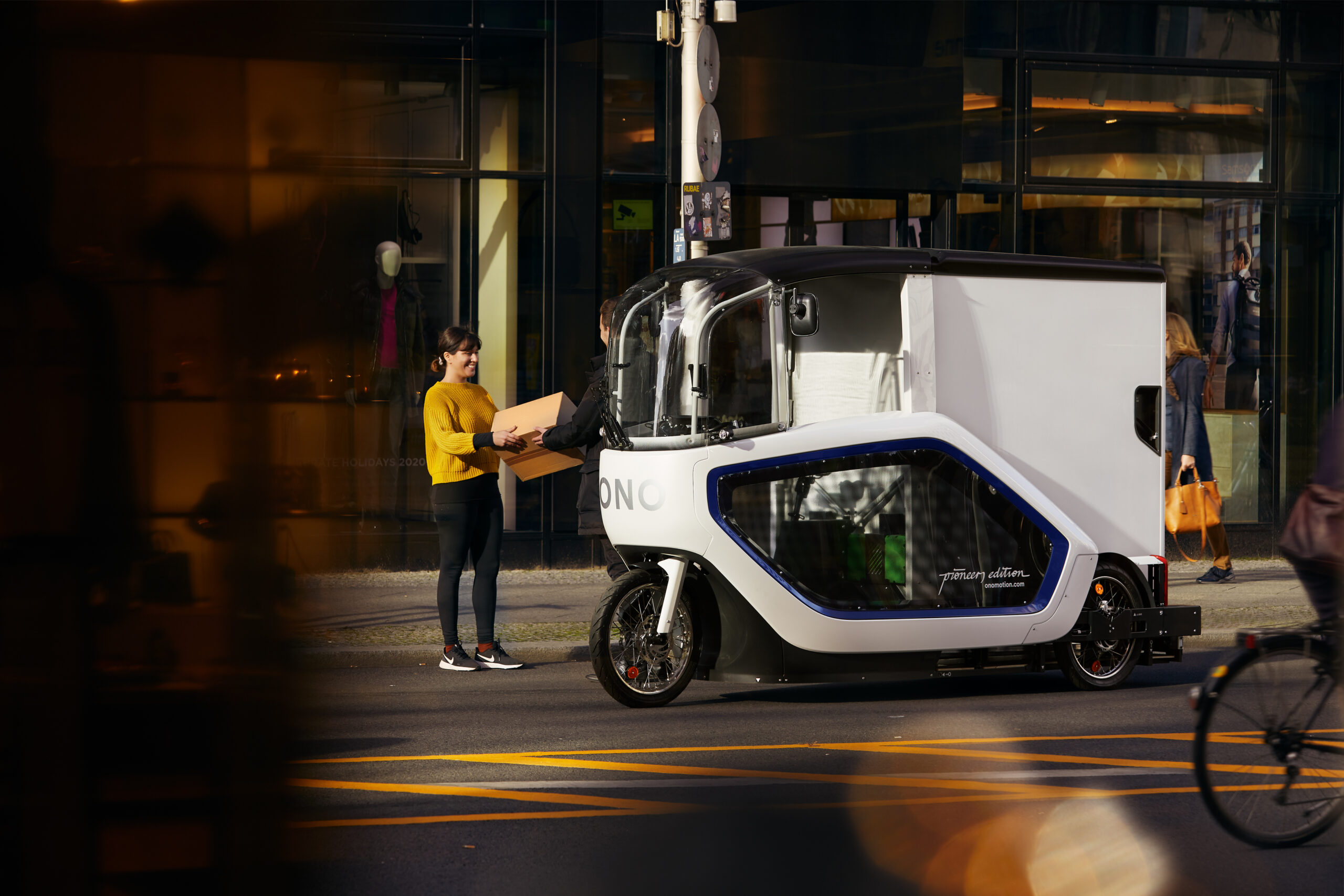Tretbox becomes ONO: New mobility service provider completes rebranding
Berlin, 02.07.2018 – Tretbox becomes ONO: Shortly after the start of the test phase with a functional carrier, the new mobility company Tretbox renames itself. Under the name ONO, the team around the founders Beres Seelbach, Philipp Kahle and Murat Günak is working on the vision of an improved quality of life in cities worldwide. To this end, ONO is developing a new type of e-cargo bike with functional aesthetics down to the last detail. Murat Günak, the former chief designer of the Volkswagen Group, is responsible for this. The use of ONOs in courier, express and parcel delivery (CEP) is expected to significantly reduce congestion and environmental pollution in cities. Series production will start next year, with Germany as the production location.
“Oneness”: New name reflects self-image
“The ONO brand is intended to evoke associations with the term “ONE”, in the sense of unity or wholeness, and thus provide orientation on the way to a new era of mobility,” says Murat Günak, CO-Founder and Head of Design at ONO. “To this end, we are working on an e-cargo bike with quality standards from the automotive industry that sets it apart from previous vehicles. In the future, ONOs will combine sustainable, space-saving and environmentally friendly product design. In addition, we will offer a service package that lays an essential foundation for longevity.” ONO will lease the e-cargo bike, which is currently under development, to delivery services and, in perspective, to end customers. The young company commits itself to the highest quality standards by taking full responsibility for repairs and maintenance.
Nothing has changed for customers in terms of service
The new delivery concept is running 100 percent successfully, says Simon. Customers haven’t even noticed the switch to the cargo bike, he said. “We started with small delivery quantities to test the new processes. In the meantime, the Cargobikes take over one to two complete Sprinter tours every day. Initially, we are concentrating on the pick-up and delivery service for MEWA work and business clothing,” explains the mobility manager. Delivery by truck to the city hub takes place in the early morning, before rush hour, and pickup in the late evening. Further distribution is absolutely emission-free. “We have a higher stop density with the cargo bike, which means more customers can be delivered on the route. In places where our service drivers have difficulty finding a stopping place by truck, or where there is no direct access, the use of cargo bikes is even significantly faster and more efficient,” says Simon.
Sophisticated depot system reduces truck volumes in cities
The e-cargo bikes are to be used in conjunction with microdepots operated by partners from the CEP sector in major cities. The strategy focuses on vacant stores, logistics areas, parking lots and parking garages. The depot costs are offset by the lower last-mile delivery costs associated with e-cargo bikes. “The 2017 sustainability study by the German Parcel & Express Logistics Association showed: The more urban and higher the population or household density per square kilometer, the better the area is also economically suitable for the micro depot concept,” says Beres Seelbach, CO-founder and CEO of ONO. Each individual ONO will have a loading volume of around two cubic meters, so four ONO containers can replace a standard delivery truck with a loading volume of around eight cubic meters.
Roll-out for CEP markets in large European cities
Initially, large European cities are to be developed. Initially, the CEP and cargo sector will be served, but from 2023 the roll-out of an ONO model is also planned for private customers. By 2025, the manufacturer aims to be represented in 50 major European cities with ONOs for the delivery market.
Cities should belong to the people once again
MEWA has been providing full-service corporate textiles since 1908 and is thus considered a pioneer of “Cars and trucks bother city dwellers with dirt, noise, confinement and ugliness,” Beres Seelbach explains the company’s vision. “Clean, quiet and space-saving mobility has the potential to bring the quality of life of rural life to cities. Urbanites will reclaim their cities in the medium term and do away with private cars and trucks. At the same time, roads and parking lots will no longer be developed to accommodate cars, but will be optimized for bicycles and cargo bikes.”







